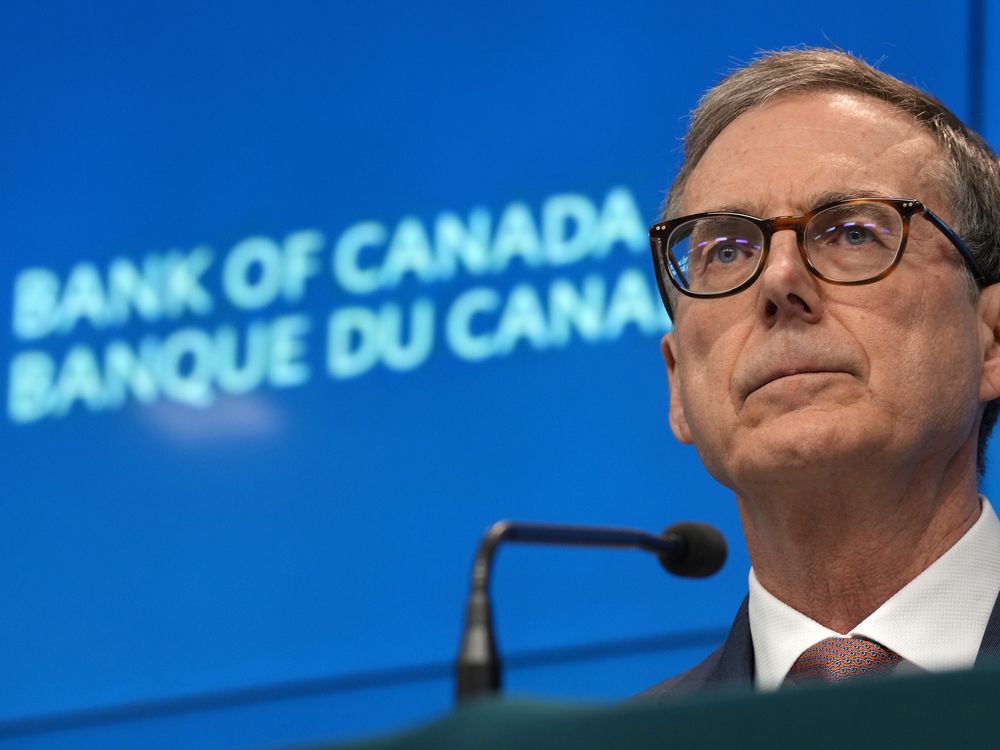Royal also sees Bank of Canada cutting interest rate to 2% which ‘should take edge off’
Article content
The Bank of Canada all but declared victory over inflation in 2024 and started cutting interest rates, which gave some people relief, but Royal Bank of Canada’s (RBC) chief economist Frances Donald says some prices are still 20 per cent higher than they were before the pandemic, and that’s something Canadians will be dealing with in 2025.
Article content
Article content
High prices, she said, are going to be one of the major economic themes in 2025, along with the pressure that Donald Trump’s election in the United States will put on Canada.
Advertisement 2
Article content
Below, Donald gives her outlook for the year, including whether Canada is entering a recession, the threat of 25 per cent tariffs and how the Canadian dollar will hold up with all the headwinds the country is facing.
FP: The economy in 2024 did not hit a technical recession, but growth is still soft. What do you think needs to happen to turn that around?
FD: We should accept slower economic growth as somewhat of the new normal for the next few years. We tend to think about growth as coming from two big-picture places. The first is, how many people do you have working in your economy? That’s your labour force participation rate. And the second is productivity. Canada actually has really terrible productivity growth, it’s actually been negative; and in the next three years, Canada has changed its immigration policy to such a significant extent that we’re actually going to see population declines for the next few years. That means this economy is not going to grow very quickly.
The silver lining is that in the past several years, the economy as a whole might have been growing, but every Canadian’s share of that economy, or GDP per capita, has actually been shrinking. What we might see in the next few years is the reverse of that, which is that the total economic growth might seem like it’s stuck in neutral, but as the population declines, each person’s share of that growth might increase.
Article content
Advertisement 3
Article content
FP: What is RBC’s expectation for growth next year?
FD: We see slow growth in 2025, but by the end of the year, those interest rate declines that the Bank of Canada has been implementing should help to take the edge off. At the same time, there’s so much we don’t know about what 2025 will look like, largely because while we’ve heard that there will be tariffs imposed on us, we just don’t know their magnitude, their timing or which goods they’ll be applied on.
The combination of those factors could be impactful at the margin or throw Canada into a recession depending on their size. It’s easier for us to look into the future when we have defined policies. Tariffs will be hard on Canada and hard on the United States, and they’re more likely to push down growth than increase it.
FP: RBC has the Bank of Canada cutting its policy rate for the first half of the year and then holding at two per cent. Why does RBC expect it to go that low?
FD: It’s our take that Canadian interest rates are still in restrictive territory. They need to move right through neutral and actually move into easing territory. The job market continues to weaken, the unemployment rate will rise, most levels of activity, from businesses to households, are soft and momentum is weak. Everybody has their own estimate of where exactly that neutral territory lies. We think it’s somewhere around 2.5 per cent for Canada. Our call for two per cent is both a call on where we think we have to drive through neutral, and it’s also a call on the fact that we think this economy needs more support and that the job market will need more support over the next six months. At the same time, as forecasters, we have to pencil in a number as what we think is a reasonable base case, but there’s a lot of uncertainty around that number.
Advertisement 4
Article content
FP: The loonie dipped below 70 cents U.S. in December due to tariff threats, political uncertainty in Ottawa and the potential divergence between the Bank of Canada and the U.S. Federal Reserve. What does this mean for the loonie next year?
FD: The primary reason that the Canadian dollar is weakening is because the U.S. dollar is strengthening, and it’s strengthening across currencies across the entire world. This isn’t just a Canada story. It’s happening in Europe and across Asia and in emerging markets as well. The challenge, however, is that U.S. interest rates are likely to stay much higher than Canadian interest rates. Put simply, if you could put your money in one piggy bank that gave you a four per cent return and one that gave you two per cent, which one would you choose? You’d go towards the four per cent rate, and that’s how currencies end up moving towards the countries with the highest interest rate over time.
The slightly good news is that the currency, as it moves, doesn’t wait until the news of the day to become weaker or stronger. It incorporates expectations over the next two to five years, and the currency market and the bond markets have already incorporated their expectation of a pretty big difference between U.S. rates and Canadian rates over the next year. The market is already expecting that rates will stay at least a full percentage point differential. So, rather than expect the Canadian dollar to float around 80 cents, for example, it’s more likely that it floats around 72 to 75 cents over this period.
Advertisement 5
Article content
FP: There were a lot of worries about mortgage renewals in 2025, but with rates falling at the speed they’re falling, does this still pose a risk to the economy next year?
FD: Generally, our concern around the housing market is a little bit less to do with a mortgage renewal cliff as interest rates decline and more to do with the job market. Economists worry about folks not being able to pay their mortgages for two reasons.
The first is that the mortgage payment itself becomes much higher, in part because of stress testing, in part because of wage growth and in part because Canadians have historically always prioritized their mortgage payment over other areas. As Canadians prioritize higher mortgage payments, that money has to come from somewhere. And you could see it come out of just general retail sales activity, services spending or restaurant spending.
The second reason folks struggle to pay their mortgage is a bigger and more negative one, and that is that they lose their job and they don’t have income. What we’re watching more closely is the sort of melting up of the unemployment rate and whether we start to see layoff activity occur. If that happens, then it’s more difficult for folks to pay their mortgage. That’s in part why we also think the Bank of Canada has to cut rates, not just to ease variable-rate mortgage payments, which is a small segment of Canadians, but to make sure the economy doesn’t weaken to a point where we do see larger layoff activity.
Advertisement 6
Article content
FP: Are there any uncertainties we should be watching for in the global economy next year?
FD: Canada’s economy is weakening, and we tend to self-flagellate because the U.S. economy is so strong. But at the same time, while there’s plenty that Canada needs to work on domestically, there are also global shocks that are impacting Canadians and Europeans and Asians as well, and those include really sizeable geopolitical fragilities, more frequent and severe weather events that are coming through and a global interest rate shock that pulled on economies all across the world.
Recommended from Editorial
-

Trump tariff threat looms over interest rate path in 2025
-

Bank of Canada’s decision to cut by half point ‘a close call’
-

Canada’s economy grows more than expected
Now that isn’t to say that everything is bad. Of course, economists are the first to raise their hand and say that Canada needs more innovation. It needs a more competitive tax system. It needs to diversify its business lines and its trade lines. But Canada also has a lot going for it. Even though we’ve had some shakeups in Ottawa more recently, we tend to have a relatively stable political environment at multiple levels. We have an incredibly educated population and we have resources that range from energy to critical minerals. While many of the factors that influence Canada are outside our control and are impacting economies globally, there’s also enough tinder in Canada to help bring back the fire in this economy.
This interview has been edited for length and clarity.
• Email: jgowling@postmedia.com
Bookmark our website and support our journalism: Don’t miss the business news you need to know — add financialpost.com to your bookmarks and sign up for our newsletters here.
Article content
RBC chief economist says slower growth the ‘new normal’
2025-01-06 11:00:54








